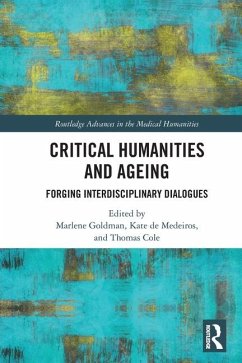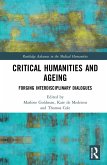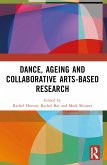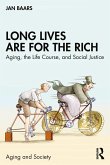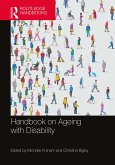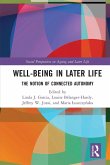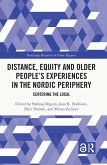Critical Humanities and Ageing
Forging Interdisciplinary Dialogues
Herausgeber: Goldman, Marlene; Cole, Thomas; De Medeiros, Kate
Critical Humanities and Ageing
Forging Interdisciplinary Dialogues
Herausgeber: Goldman, Marlene; Cole, Thomas; De Medeiros, Kate
- Broschiertes Buch
- Merkliste
- Auf die Merkliste
- Bewerten Bewerten
- Teilen
- Produkt teilen
- Produkterinnerung
- Produkterinnerung
Providing a critical humanities approach to ageing, this book addresses new directions in age studies.
Andere Kunden interessierten sich auch für
![Critical Humanities and Ageing Critical Humanities and Ageing]() Critical Humanities and Ageing114,99 €
Critical Humanities and Ageing114,99 €![Precarity and Ageing Precarity and Ageing]() Precarity and Ageing45,99 €
Precarity and Ageing45,99 €![Dance, Ageing and Collaborative Arts-Based Research Dance, Ageing and Collaborative Arts-Based Research]() Dance, Ageing and Collaborative Arts-Based Research66,99 €
Dance, Ageing and Collaborative Arts-Based Research66,99 €![Long Lives Are for the Rich Long Lives Are for the Rich]() Jan BaarsLong Lives Are for the Rich33,99 €
Jan BaarsLong Lives Are for the Rich33,99 €![Handbook on Ageing with Disability Handbook on Ageing with Disability]() Handbook on Ageing with Disability38,99 €
Handbook on Ageing with Disability38,99 €![Well-being In Later Life Well-being In Later Life]() Well-being In Later Life37,99 €
Well-being In Later Life37,99 €![Distance, Equity and Older People's Experiences in the Nordic Periphery Distance, Equity and Older People's Experiences in the Nordic Periphery]() Distance, Equity and Older People's Experiences in the Nordic Periphery55,99 €
Distance, Equity and Older People's Experiences in the Nordic Periphery55,99 €-
-
-
Providing a critical humanities approach to ageing, this book addresses new directions in age studies.
Hinweis: Dieser Artikel kann nur an eine deutsche Lieferadresse ausgeliefert werden.
Hinweis: Dieser Artikel kann nur an eine deutsche Lieferadresse ausgeliefert werden.
Produktdetails
- Produktdetails
- Routledge Advances in the Medical Humanities
- Verlag: Taylor & Francis Ltd
- Seitenzahl: 344
- Erscheinungstermin: 27. Mai 2024
- Englisch
- Abmessung: 234mm x 156mm x 19mm
- Gewicht: 534g
- ISBN-13: 9780367630935
- ISBN-10: 0367630931
- Artikelnr.: 70337943
- Herstellerkennzeichnung
- Libri GmbH
- Europaallee 1
- 36244 Bad Hersfeld
- gpsr@libri.de
- Routledge Advances in the Medical Humanities
- Verlag: Taylor & Francis Ltd
- Seitenzahl: 344
- Erscheinungstermin: 27. Mai 2024
- Englisch
- Abmessung: 234mm x 156mm x 19mm
- Gewicht: 534g
- ISBN-13: 9780367630935
- ISBN-10: 0367630931
- Artikelnr.: 70337943
- Herstellerkennzeichnung
- Libri GmbH
- Europaallee 1
- 36244 Bad Hersfeld
- gpsr@libri.de
Marlene Goldman is a Professor in the Department of English at the University of Toronto who specializes in Canadian literature, age studies, and medical humanities. In addition to her scholarly works, she has also written, directed, and produced a short film about dementia entitled "Piano Lessons" based on Alice Munro's short story "In Sight of the Lake" from her collection Dear Life (2004). Her film Torching the Dusties, about ageing and intergenerational warfare from Margaret Atwood's recent collection Stone Mattress (2014), premiered at the Fright Festival in London, U.K. Kate de Medeiros is the O'Toole Family Professor of Gerontology in the Department of Sociology and Gerontology and a Scripps Research Fellow at Miami University, Oxford, Ohio. Dr. de Medeiros's research is broadly focused on understanding the experience of later life using narratives and other qualitative and mix-methods approaches. Research topics include storying later life, the meaning of home, suffering in old age, generativity, moral development in later life, and friendships and social connectivity among people living with dementia. Thomas R. Cole is the McGovern Chair and Director of the McGovern Center for Humanities and Ethics at University of Texas Health Science Center in Houston. His work has been featured in The New York Times, NPR, and PBS. Cole has served as an advisor to the President's Council on Bioethics and the United Nations NGO Committee on Ageing. His book The Journey of Life: A Cultural History of Aging in America was nominated for a Pulitzer Prize.
Part I What Does It Mean to Grow Old? 1.Abolition, Women's Rights, and the
Contested Value of Being Old in the Nineteenth-Century United States.
Response 1 - Abstracting Ageist Perceptions, Societal Ills, and Racist
Burdens on the Psychological Well-being of Black Women: Is "Successful"
Aging Still an Option? 2.There is No Such Thing as "the Elderly": Reading
Age in Nineteenth-Century American Literature. Response 2 -
Intersectionality and Age. 3.Cognition and Recognition in the Ethics of
Dementia Care. Response 3 - Philosophical Approaches to Dementia: Some
Further Reflections on Agency and Identity. 4.Agency and the Aging Artist.
Response 4 - The Art of Bending the Successful Aging Paradigm: Contemporary
Older Artists and their Continuing Creative Practices. Part II: Aging: Old
Age and Disability. 5.What the Theatre Taught Me about Alzheimer's.
Response 5 - Fuchs' Case for Stranger Visions. 6.Ableism and Ageism:
Insights from Disability Studies for Aging Studies. Response 6 - Fears
Generating Ageism and Ableism Are Well-Founded in a Society that Does Not
Seek or Support Full Inclusion of All Persons. 7.In Conversation with Sally
Chivers: Reimagining Long-Term Residential Care. Response 7 - Aging and
Caring amid Words, Stories, and Texts. 8.Queer Aging and the Significance
of (Narrative) Representation. Response 8 - What We Miss. Part III: Aging,
Old Age, and Activism. 9.Conceptualizing Ageism: From Prejudice and
Discrimination to Fourth Ageism. 10.Aging in the Anthropocene: Generational
Time, Declining Longevity, Posthuman Aging. Response 10 - Aging in the
Anthropocene: Geological Time, Generational Place. 11.Critical
Conversations on Aging Futures: Decolonial Perspectives. Response 11 - The
Age of (Relentless) Responsibility. Part IV: Old Age and Humanistic
Approaches to Care. 12.Intimacy and Distance: Reflections on Eldercare in
the United States. Response 12 - Towards a Deeper Understanding of Care in
Later Life. 13.Care Work and the Politics of Interdependence. Response 13 -
Developing New Forms of Care: From Individual to Collective Agency.
14.Posthuman Care and Posthumous Life in Marjorie Prime. Response 14 - Only
Persons Can Provide Person-Centered Care for People Living with Dementia:
"Walter Prime" and His Ilk Miss the Mark. 15.Risky Business: Bringing
Transformative Creativity to U.S. Nursing Homes. Response 15 - Valuing Risk
in Residential Long-term Care: Setting an Important Ethical Standard for
Supporting and Nurturing Human Flourishing.
Contested Value of Being Old in the Nineteenth-Century United States.
Response 1 - Abstracting Ageist Perceptions, Societal Ills, and Racist
Burdens on the Psychological Well-being of Black Women: Is "Successful"
Aging Still an Option? 2.There is No Such Thing as "the Elderly": Reading
Age in Nineteenth-Century American Literature. Response 2 -
Intersectionality and Age. 3.Cognition and Recognition in the Ethics of
Dementia Care. Response 3 - Philosophical Approaches to Dementia: Some
Further Reflections on Agency and Identity. 4.Agency and the Aging Artist.
Response 4 - The Art of Bending the Successful Aging Paradigm: Contemporary
Older Artists and their Continuing Creative Practices. Part II: Aging: Old
Age and Disability. 5.What the Theatre Taught Me about Alzheimer's.
Response 5 - Fuchs' Case for Stranger Visions. 6.Ableism and Ageism:
Insights from Disability Studies for Aging Studies. Response 6 - Fears
Generating Ageism and Ableism Are Well-Founded in a Society that Does Not
Seek or Support Full Inclusion of All Persons. 7.In Conversation with Sally
Chivers: Reimagining Long-Term Residential Care. Response 7 - Aging and
Caring amid Words, Stories, and Texts. 8.Queer Aging and the Significance
of (Narrative) Representation. Response 8 - What We Miss. Part III: Aging,
Old Age, and Activism. 9.Conceptualizing Ageism: From Prejudice and
Discrimination to Fourth Ageism. 10.Aging in the Anthropocene: Generational
Time, Declining Longevity, Posthuman Aging. Response 10 - Aging in the
Anthropocene: Geological Time, Generational Place. 11.Critical
Conversations on Aging Futures: Decolonial Perspectives. Response 11 - The
Age of (Relentless) Responsibility. Part IV: Old Age and Humanistic
Approaches to Care. 12.Intimacy and Distance: Reflections on Eldercare in
the United States. Response 12 - Towards a Deeper Understanding of Care in
Later Life. 13.Care Work and the Politics of Interdependence. Response 13 -
Developing New Forms of Care: From Individual to Collective Agency.
14.Posthuman Care and Posthumous Life in Marjorie Prime. Response 14 - Only
Persons Can Provide Person-Centered Care for People Living with Dementia:
"Walter Prime" and His Ilk Miss the Mark. 15.Risky Business: Bringing
Transformative Creativity to U.S. Nursing Homes. Response 15 - Valuing Risk
in Residential Long-term Care: Setting an Important Ethical Standard for
Supporting and Nurturing Human Flourishing.
Part I What Does It Mean to Grow Old? 1.Abolition, Women's Rights, and the
Contested Value of Being Old in the Nineteenth-Century United States.
Response 1 - Abstracting Ageist Perceptions, Societal Ills, and Racist
Burdens on the Psychological Well-being of Black Women: Is "Successful"
Aging Still an Option? 2.There is No Such Thing as "the Elderly": Reading
Age in Nineteenth-Century American Literature. Response 2 -
Intersectionality and Age. 3.Cognition and Recognition in the Ethics of
Dementia Care. Response 3 - Philosophical Approaches to Dementia: Some
Further Reflections on Agency and Identity. 4.Agency and the Aging Artist.
Response 4 - The Art of Bending the Successful Aging Paradigm: Contemporary
Older Artists and their Continuing Creative Practices. Part II: Aging: Old
Age and Disability. 5.What the Theatre Taught Me about Alzheimer's.
Response 5 - Fuchs' Case for Stranger Visions. 6.Ableism and Ageism:
Insights from Disability Studies for Aging Studies. Response 6 - Fears
Generating Ageism and Ableism Are Well-Founded in a Society that Does Not
Seek or Support Full Inclusion of All Persons. 7.In Conversation with Sally
Chivers: Reimagining Long-Term Residential Care. Response 7 - Aging and
Caring amid Words, Stories, and Texts. 8.Queer Aging and the Significance
of (Narrative) Representation. Response 8 - What We Miss. Part III: Aging,
Old Age, and Activism. 9.Conceptualizing Ageism: From Prejudice and
Discrimination to Fourth Ageism. 10.Aging in the Anthropocene: Generational
Time, Declining Longevity, Posthuman Aging. Response 10 - Aging in the
Anthropocene: Geological Time, Generational Place. 11.Critical
Conversations on Aging Futures: Decolonial Perspectives. Response 11 - The
Age of (Relentless) Responsibility. Part IV: Old Age and Humanistic
Approaches to Care. 12.Intimacy and Distance: Reflections on Eldercare in
the United States. Response 12 - Towards a Deeper Understanding of Care in
Later Life. 13.Care Work and the Politics of Interdependence. Response 13 -
Developing New Forms of Care: From Individual to Collective Agency.
14.Posthuman Care and Posthumous Life in Marjorie Prime. Response 14 - Only
Persons Can Provide Person-Centered Care for People Living with Dementia:
"Walter Prime" and His Ilk Miss the Mark. 15.Risky Business: Bringing
Transformative Creativity to U.S. Nursing Homes. Response 15 - Valuing Risk
in Residential Long-term Care: Setting an Important Ethical Standard for
Supporting and Nurturing Human Flourishing.
Contested Value of Being Old in the Nineteenth-Century United States.
Response 1 - Abstracting Ageist Perceptions, Societal Ills, and Racist
Burdens on the Psychological Well-being of Black Women: Is "Successful"
Aging Still an Option? 2.There is No Such Thing as "the Elderly": Reading
Age in Nineteenth-Century American Literature. Response 2 -
Intersectionality and Age. 3.Cognition and Recognition in the Ethics of
Dementia Care. Response 3 - Philosophical Approaches to Dementia: Some
Further Reflections on Agency and Identity. 4.Agency and the Aging Artist.
Response 4 - The Art of Bending the Successful Aging Paradigm: Contemporary
Older Artists and their Continuing Creative Practices. Part II: Aging: Old
Age and Disability. 5.What the Theatre Taught Me about Alzheimer's.
Response 5 - Fuchs' Case for Stranger Visions. 6.Ableism and Ageism:
Insights from Disability Studies for Aging Studies. Response 6 - Fears
Generating Ageism and Ableism Are Well-Founded in a Society that Does Not
Seek or Support Full Inclusion of All Persons. 7.In Conversation with Sally
Chivers: Reimagining Long-Term Residential Care. Response 7 - Aging and
Caring amid Words, Stories, and Texts. 8.Queer Aging and the Significance
of (Narrative) Representation. Response 8 - What We Miss. Part III: Aging,
Old Age, and Activism. 9.Conceptualizing Ageism: From Prejudice and
Discrimination to Fourth Ageism. 10.Aging in the Anthropocene: Generational
Time, Declining Longevity, Posthuman Aging. Response 10 - Aging in the
Anthropocene: Geological Time, Generational Place. 11.Critical
Conversations on Aging Futures: Decolonial Perspectives. Response 11 - The
Age of (Relentless) Responsibility. Part IV: Old Age and Humanistic
Approaches to Care. 12.Intimacy and Distance: Reflections on Eldercare in
the United States. Response 12 - Towards a Deeper Understanding of Care in
Later Life. 13.Care Work and the Politics of Interdependence. Response 13 -
Developing New Forms of Care: From Individual to Collective Agency.
14.Posthuman Care and Posthumous Life in Marjorie Prime. Response 14 - Only
Persons Can Provide Person-Centered Care for People Living with Dementia:
"Walter Prime" and His Ilk Miss the Mark. 15.Risky Business: Bringing
Transformative Creativity to U.S. Nursing Homes. Response 15 - Valuing Risk
in Residential Long-term Care: Setting an Important Ethical Standard for
Supporting and Nurturing Human Flourishing.

